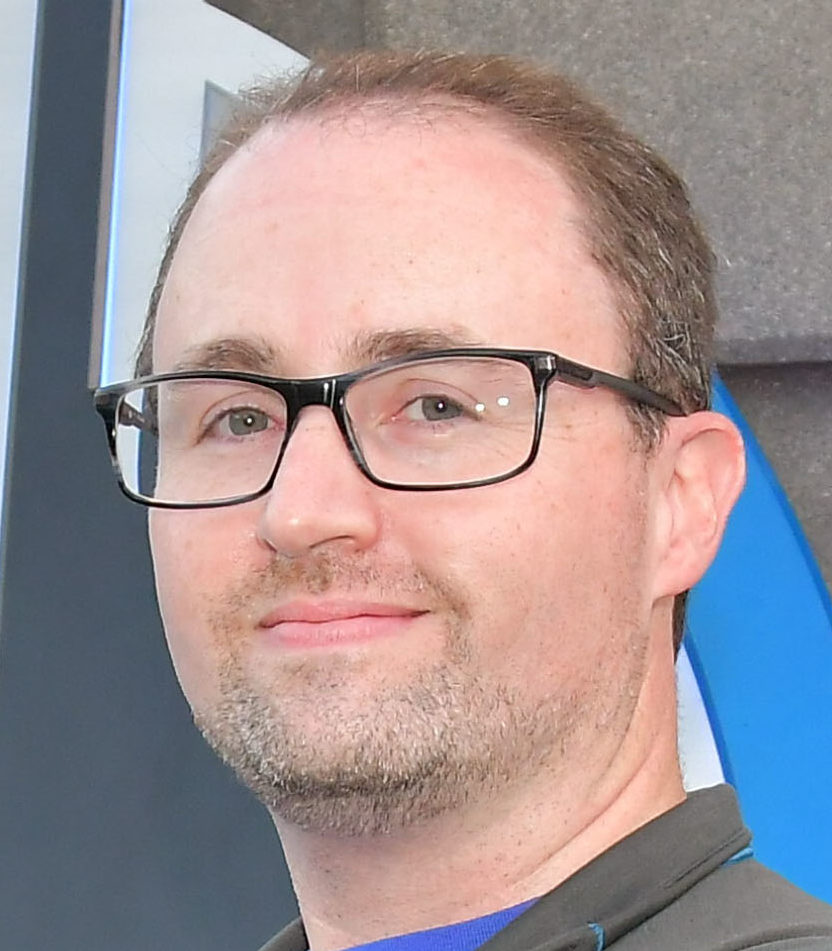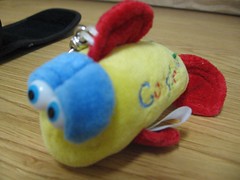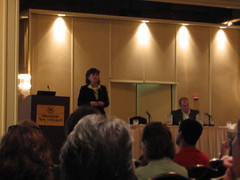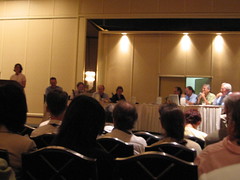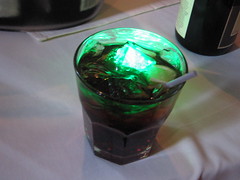Genevieve Bell – Director of User Experience at Intel and an anthropologist
Lee Rainie – Director, Pew Internet & American Life Project
Allen Renear – Professor of Library and Information Science at University of Illinois at Urbana-Champaign
Wendy Schultz – Director of Infinite Futures and Fellow of the World Futures Studies Federation
Steven Bell, Associate University Librarian for Research and Instructional Services at Temple University, was moderator and asked some questions of them at the end.
The year is 2017. Each panelist was asked to speak about what they think libraries will look like then. More specifically, what reference service will look like.
Genevieve Bell went first. She asserted that talking about the future of technology is often just a way to avoid discussing the present.
She thinks we’re currently seeing a return to some aspects of the Victorian-era private libraries – people are accumulating more and more personal media. DVDs, CDs, digital movies or music, books, etc. Traditional library roles are being taken over a bit thanks to this. But, meanwhile paper is not going anywhere anytime soon – we seem to like it too much.
While these roles are taken over, libraries are shifting to a new one: having a center of gravity, as a location. Physically visiting a library to get a card is often considered a rite of passage, and libraries more and more run activities for the community. In Australian, there are even popular sessions on how to organize your home collection with Dewey! I admit I probably wouldn’t sign up for that one, but to each his own 🙂 Libraries are also becoming central information distribution points, as with tax forms.
Another role as a place is to provide a place for people to be together. People want to be where others are when learning.
Lee Rainie mentioned that while in the past everyone got 15 minutes of fame, today everyone is famous to 15 people.
He foresees the development of an ‘internet of things’ – physical objects will share data among themselves to make our lives easier. These objects are known as ‘spimes’, a term coined by author Bruce Sterling. Every object will carry information about itself – reviews built in to the chair you’re sitting on, for example.
Lee also thinks the most interesting battles between now and 2017 will be in the regulatory bodies like the FCC – they have the power to shape a lot of the coming landscape. Copyright, trademarks, etc. are all huge issues. The band The White Stripes has stopped improvising at live shows because they can’t copyright a song fast enough before a fan has a recording posted online.
So, why does he think libraries will still be around in 2017? Nobody knows how to handle information needs better, or how to manage that information. We understand the importance of standards, teach about info literacy, defend freedom of speech, guide conversations about new policies, etc.
Allen Renear says XML will be “the tunnels under Disneyland†for all we do – providing a sort of universal backbone.
By 2017 we won’t look for articles to read in the sciences – that very ideal will be laughable. Due to the ongoing explosion of the sheer amount of information available, it will be impossible to read everything relevant to a topic. Instead, we’ll see the development of ‘literature mining’- I didn’t get down the details of this concept, but it involves indirect use of many articles at the same time. Users will spend time in the “Scholarly Search Environment trance†– developing queries, tracking references, judging, comparing terms, all subconsciously. This prediction seems pretty accurate to me – I slip into a minor form of that state myself when doing research even today. I can’t always outline for anyone the exact steps I took to synthesize information during a search – in the end it feels almost like proceeding on hunches. Allen admits that this sort of horizontal use of literature will be practical, but hard work with lots of questions.
Wendy Schultz opened with a more practical reason why the reference desk will still be around in 2017: “Universities are really bad at getting rid of furniture.â€
She also brought up the idea that libraries will act as a social hub in the future more so than they currently do.
Constant environmental scans will be crucial to spot change coming – find that patient zero who grasps onto an idea first, sort of like epidemiology. All aspects of the environment must be taken into account: Society, politics, economics, discovery, etc. We need to cultivate an immersion in that sea of information. We’ll break items down into their component pieces and then recombine them into new results.
Unfortunately, the session ran out of time so most of the discussion was cut at the end. Steven Bell did note that it is crucial for libraries to stay abreast of new changes in order to ensure the future is one where we are still relevant – it won’t happen automatically.
